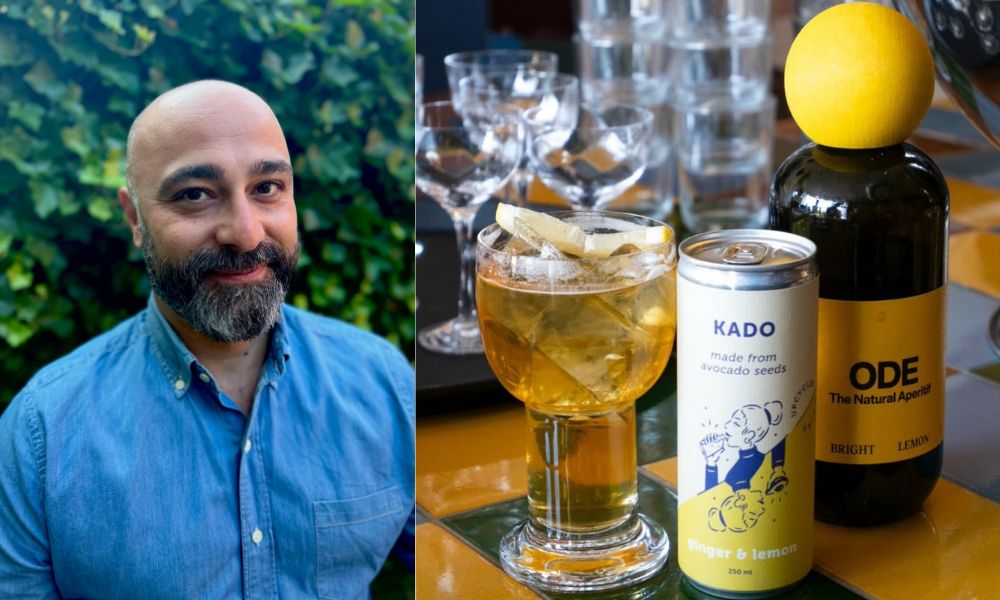WINNER 2024: Cafés and restaurants’ leftover peels from grapefruit, oranges, lemons, clementines, limes – what could you do with them? Arash J Sabet asked himself the question, and after a little experimentation he also found the answer. Citrus residues can be used to make flavor enhancers, colorants and texture improvers – a kind of natural additive for use in the restaurant industry.
When Circular Gastronomy named the winners of the Circular Gastronomy Challenge 2024 on January 27, one of them was Arash J Sabet, who focuses on citrus peels as an enhancing ingredient. The jury’s motivation was as follows:
“For the idea of a business model based on creating ingredients from recovered citrus peels on a large scale – for use in restaurants, bakeries, bars and ice cream parlors. It’s about products that enhance flavor, texture and color – plant-based, gluten- and egg-free.”
“Imagine that you drink orange juice for breakfast at the hotel where you are staying,” says Arash J Sabet. “Then for lunch you eat a stew whose sauce has been given the perfect consistency with the help of the orange peel, and in the evening at the bar in the same hotel you order a drink flavored with oil extract from the peel in question – all from the same orange. Then imagine that breakfast but from the much broader perspective of the juice industry, whose side streams (i.e. what is normally thrown away) are instead refined into those beneficial ingredients, so that lunch can be consumed at any restaurant in the country, and the drink at any bar.”
This is how Malmö resident Sabet, who worked in the restaurant industry for 18 years, explained his idea when he submitted his application to the Circular Gastronomy Challenge in the fall of 2024.
– I know how it is. I know how short of time you are. Many of those who work in restaurants want to work more sustainably but do not always have either the financial margins or the energy to spend time or focus on finding the most sustainable alternatives.
Sabet’s idea did not come out of the blue. Since 2022, through his company Simply No Waste and with the help of his network, he has saved a full five tons of avocado pits from restaurants and cafes around Skåne from ending up in the garbage. From the pits they make a drink called Kado which is mainly sold in southern Sweden and Denmark.
So it was easy for Arash to find similar side streams to address. This time, he is targeting all kinds of citrus peels – grapefruit, oranges, lemons, clementines, limes. One of the advantages of dealing with waste from the food industry is that the raw material has already been checked and approved.
It’s a bit of a trade secret how to turn citrus peels into an ingredient that can perfectly thicken a sauce or jam or make a cocktail a beautiful shade of red, highlight the chocolate flavor in a pastry or make ice cream creamier. Sabet does reveal that the citrus molecules are broken down using electrical pulses. He has received help and investment with the technology itself from OptiCept, a Lund-based company that is currently working on extracting usable substances from organic materials. To develop the product, Arash is also collaborating with the Foodtech Innovation Network, of which Lund University of Technology is a part.
– We already have most of it in place, the “recipe” and the capacity to handle a full 20 tons of shells per month at our facility in Malmö. But before that, we need to see how the products work in reality.
The plan was to have a prototype ready this spring. Now Sabet hopes to have his products tested by chefs at Sweden Foodtech in Stockholm in September.
Now that you have won the Circular Gastronomy Challenge, what kind of support do you want?
– Previously, I have worked with B2C, that is, Business to Consumer. This is more about B2B. We need help explaining to wholesalers and purchasing managers in the restaurant industry what is so good about these products and how they differ from others that are used today in large Swedish kitchens. The strength of these products is that the raw material would otherwise be thrown away, the products are natural and plant-based, and do not contain any animal ingredients (unlike gelatin, for example) and are therefore vegan. In addition, they are locally produced, while most of the products used for the same purpose today are imported from abroad.
– To get help with further developing the products, getting chefs and pastry chefs to try them and eventually being able to scale up the entire process – that is something I also hope to get support for.
Arash J Sabet sees himself as a pioneer. It is not easy to compete with the big international companies that are already working in the field. That is why he believes communication is of the utmost importance. In addition to the fact that many in the restaurant industry would work more sustainably if only they had the time, he believes that restaurant guests also want to know more about what they are putting in their mouths.
